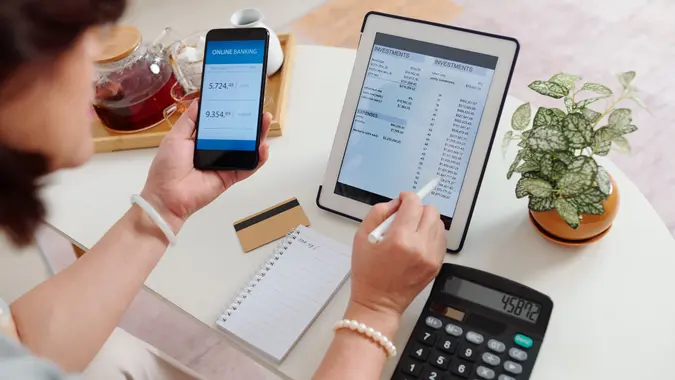Rachel Cruze: 4 Things You Should Know Before Switching Banks

Commitment to Our Readers
GOBankingRates' editorial team is committed to bringing you unbiased reviews and information. We use data-driven methodologies to evaluate financial products and services - our reviews and ratings are not influenced by advertisers. You can read more about our editorial guidelines and our products and services review methodology.

20 Years
Helping You Live Richer

Reviewed
by Experts

Trusted by
Millions of Readers
There are certain stalwarts of your everyday life, like that coffee shop you always visit or the park you hike to after work. You don’t think much about their presence — you just know they’re always there. Your bank account is a lot like that. You likely don’t think much about it; you’re just glad it’s there to keep your money safe.
However, sometimes life throws a change your way, and you need to switch banks. You might start noticing a lot of fees and surcharges eating into your earnings. Or, more felicitously, you get married and need to open a joint account with your spouse. Whatever the reason, there are a lot of factors to consider when moving from one bank to another.
As an author and financial expert, Rachel Cruze has valuable insights to share when it comes to finding a bank to suit your shifting priorities.
1. Determining the Right Kind of Bank for You
Whether you’re moving, entering the bonds of matrimony, or simply at the point where one more fee will send you over the edge, it’s time to bid adieu to your current bank. But you might not know what to look out for in a new bank. Should you go with a credit union instead?
Ramsey Solutions, an organization Cruze is affiliated with, describes credit unions as being like traditional banks, but with major differences. Most notably, credit unions are nonprofit organizations, which means they don’t have shareholders to satisfy. But before you jump to join one, it’s important to know that membership in a credit union often depends on meeting specific criteria, such as working in a particular profession or for a specific company. One drawback: Credit unions typically have fewer branches and ATMs — but they also usually come with fewer fees and pay higher interest rates.
You might also consider an online bank, or neobank, where everything happens digitally. While this can be a highly convenient option, if you need to deposit cash regularly or simply enjoy face-to-face customer service, it might not be the best fit for you.
When making the switch, Cruze encourages you to create a list of your non-negotiables for a new bank. This may include low fees, top-notch security, convenient online and mobile banking apps, automatic bill pay, mobile deposit, debit cards, and competitive interest rates for products like CDs and high-yield savings accounts.
2. Organize Your Automatic Payments
The sheer number of automatic debits and deposits coming out of and into your bank account can feel overwhelming — and the effort of rerouting them is often why people stay with a bank they don’t love. But not you. You’re going to follow Cruze’s advice to make the process as painless as possible.
She recommends starting by listing all your automatic payments and direct deposits. Before you groan, know that budgeting apps can help you more easily track these transactions. Cruze encourages sitting down and making a detailed list of all your direct deposits — not just your paycheck. “Don’t forget about things like child support, freelance work, or irregular income,” she says.
Next, tackle your automatic payments. “You want to look for automatic bill payments. You want to look for subscriptions, whether it’s monthly or annual. Recurring transfers like quarterly insurance payments, [and] other accounts that are linked to your account, like online shopping sites, I mean, anything that is in your bank account,” Cruze said. “I know it’s a lot, but you want to be able to take inventory of all of that.”
3. Get Your Documents in Order
Once you’re ready to open a new account — or join a spouse’s account — at a new bank, it’s time to gather the necessary documents. While you should research your new bank’s specific requirements, Cruze shared that you’ll generally need to have an ID like a driver’s license, documentation of your birth date, proof of your mailing address and physical address (like a utility bill) and your Social Security number.
If you’re setting up direct deposit, you’ll also need your employer’s name and contact information. Some banks require a minimum deposit to open an account, so be sure to check this beforehand.
4. Switch Your Accounts Over
Finally, head to all the sites where your old account is linked for payments or deposits and update your bank information. Double-check that the new information is showing online, and monitor your transactions to ensure everything is running smoothly with your new account.
Once you’re confident you haven’t missed anything and all your transactions are flowing smoothly, you can close your old account.
 Written by
Written by  Edited by
Edited by 

























